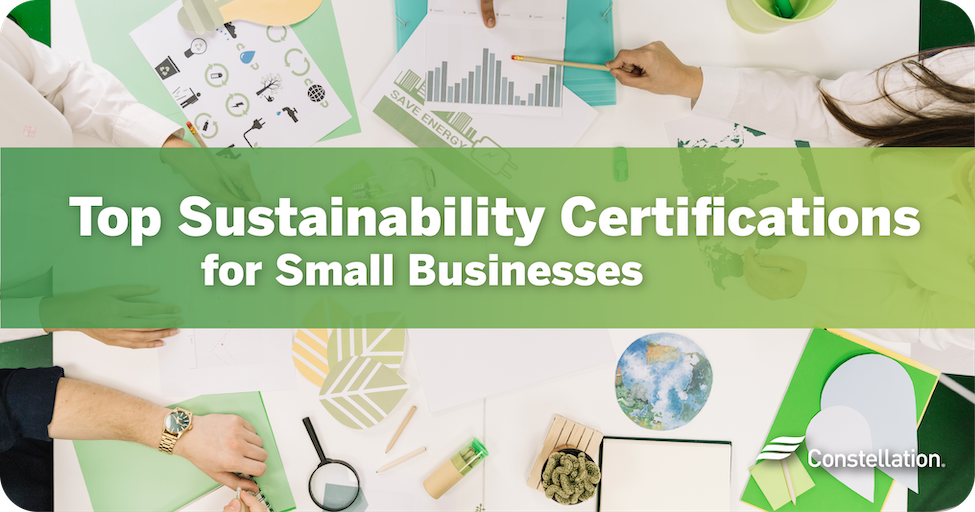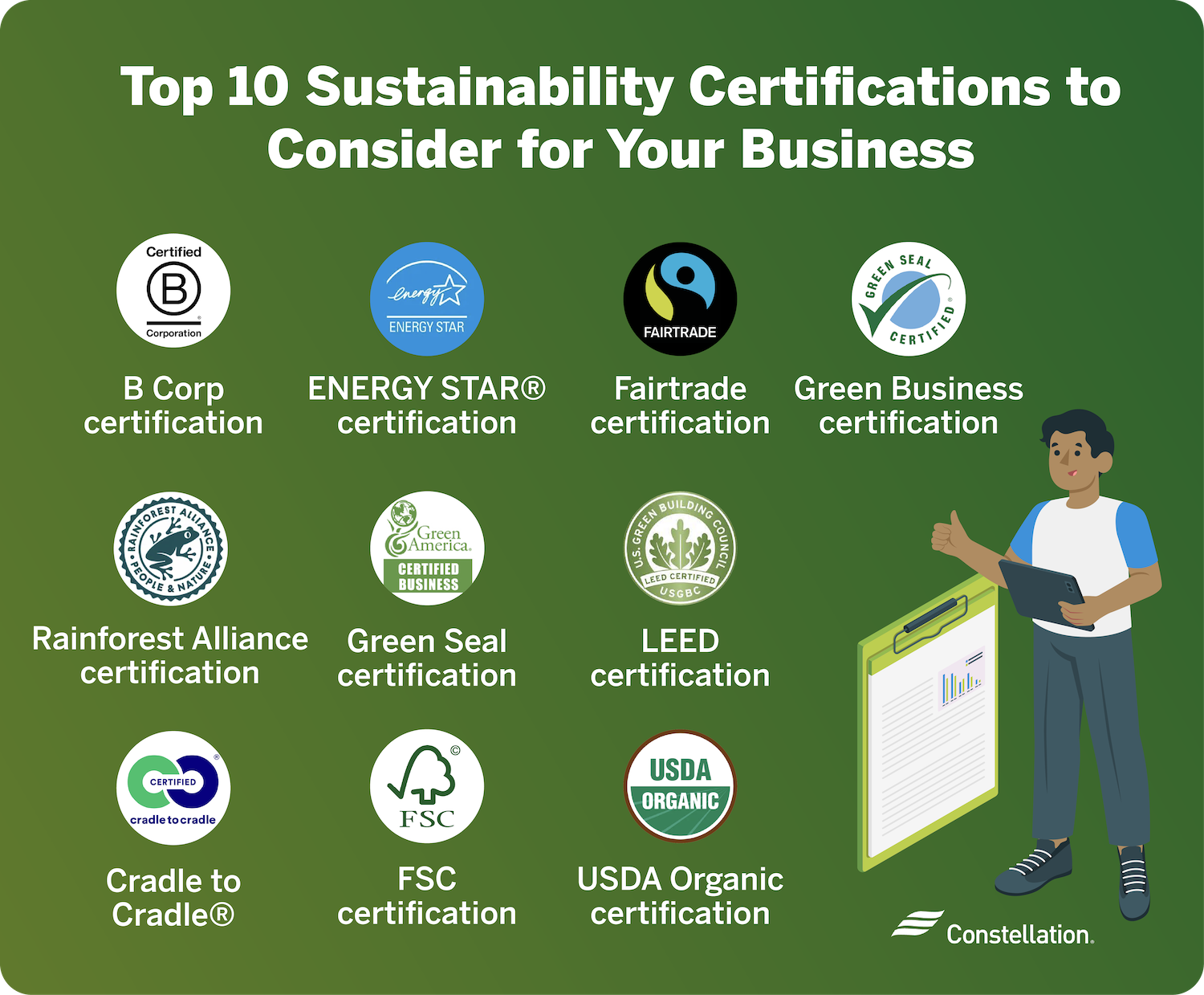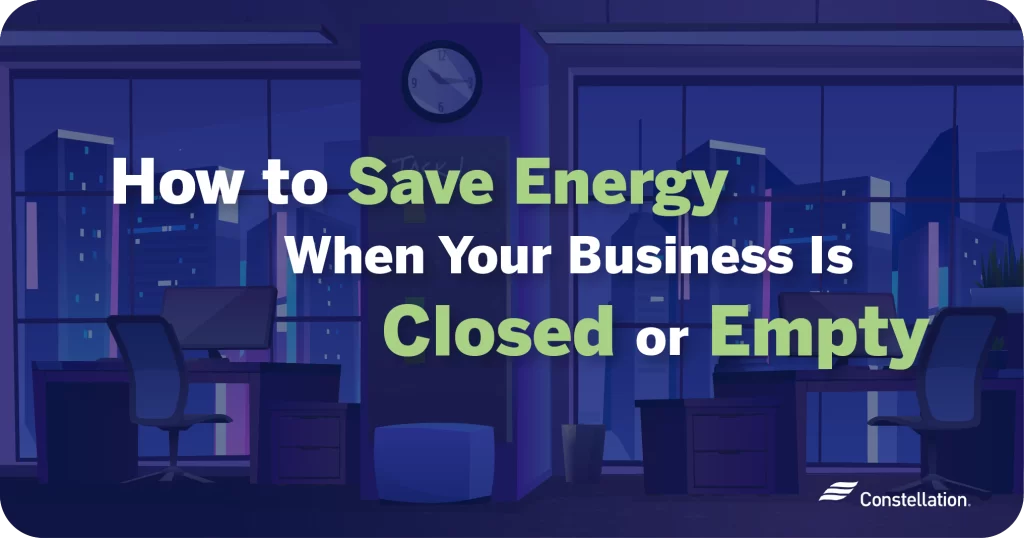
- Category:
Small Business Energy Savings -
Last updated:
June 26, 2025
Top Sustainability Certifications for Small Businesses
Sustainability certifications are an indispensable tool for small businesses. Being able to demonstrate your achievements in caring for the environment and in social responsibility establishes trust, differentiates you from competitors, builds your reputation and potentially creates opportunities for business growth.
Getting the right sustainability certifications for small businesses provides tangible proof of the effectiveness of your sustainability initiatives. Sustainability certification programs can focus on many different aspects, and each one has unique requirements and benefits.
Let’s explore the top sustainability certifications so you can choose the ones that bring you the best value while supporting your business and environmental priorities.
What is a sustainability certification?
A sustainability certification is a process that validates that your company meets certain environmental, social, economic and ethical standards set by third-party organizations. You earn them by demonstrating the responsible practices required in the certification process for a given credential.
How sustainability certifications help your small business
Sustainability certifications can contribute to the success of your business by giving you a competitive edge, strengthening your reputation and fueling responsible growth. These credentials show your commitment to operating ethically and recognizing the social and environmental impact of your business. Here are some of the top benefits of obtaining sustainability certifications for small businesses:
- Improve reputation and build trust. Credentials provide transparency and validation for your initiatives. Documenting your investment in sustainable practices establishes credibility with customers, business partners, the community at large and regulators.
- Become more efficient. Getting certified covers how your business uses energy and water, as well as how you handle waste. Improvements in these areas could streamline operations and bring long-term cost savings.
- Stand out from competitors. Everything you do to stand out from other companies can give you a valuable edge. People prefer to do business with companies that are committed to sustainable practices.
- Attract business partners. Winning customers and building strong, sustainable partnerships is part of a successful business. Environmental certifications can support this by helping you find vendors and suppliers who share your values.
- Stay ahead of regulations. With an increase in environmental regulations across industries, being compliant reduces the risk of costly penalties. Eco-friendly certifications keep you ahead in meeting or exceeding these requirements.
- Positively impact the environment. Reducing pollution and waste, making responsible use of limited resources and supporting biodiversity lead to a healthier environment for all. Environmental certifications promote ways your business can contribute.
- Increase loyalty. Business partners and customers may be more willing to stick with companies that can demonstrate and document their achievements in sustainability.
- Create new opportunities. Some certifications, like USDA Organic and Fair Trade, are required in certain markets and by some retailers. The right certifications for your company can help open doors and create new business opportunities.
Top 10 certifications for sustainable businesses
The best sustainability certificate programs for you will vary based on your industry and company goals. In general, a good place to start is by focusing on the most widely recognized certifications, then adding more credentials as they make sense and as your initiatives evolve.
Below are some of the top environmental certifications to consider for your business.
1. B Corp certification
Best for: Purpose-driven businesses in any industry.
This certification establishes standards for social and environmental performance, emphasizing accountability and transparency. It considers several impact areas, including governance, HR and employees, environment, human rights, community and customers. Companies must comply with performance requirements that balance profit and purpose. Administered by B Lab, B Corp Certification is ideal for validating your dedication to making a positive impact across each of the areas covered by the credential.
2. ENERGY STAR® certification
Best for: Businesses with physical buildings or equipment.
The U.S. Environmental Protection Agency’s ENERGY STAR® certification applies to buildings and equipment. The standards benchmark against energy consumption, energy costs and initiatives around environmental stewardship. Earning a score of 75 means the building or product performs better than 75% of similar buildings or products. The certification helps win consumer preference for products and structures that excel across energy performance standards.
3. Fairtrade certification
Best for: Companies selling products made by third-party producers.
Companies that want to work with suppliers who share their commitment to social, economic and environmental standards can pursue this certification. Supporting an ethical supply chain that promotes fair wages, safe working conditions and sustainable production practices, this credential appeals to customers who value your commitment to environmental and social responsibility.
4. Green Business certification
Best for: Eco-conscious small- to medium-sized businesses.
This environmental certification can be earned by companies that apply environmentally responsible practices across their operations. Getting certified involves evaluating your company on energy use, waste management and positive engagement with the community. It’s ideal for small- to medium-sized businesses that want to put a spotlight on their commitment to sustainability.
5. Rainforest Alliance certification
Best for: Businesses committed to sustainable sourcing and biodiversity conservation.
This certification is for businesses that want to conserve biodiversity and promote sustainable livelihoods in agriculture, forestry and tourism. It has become the standard for products produced in tropical areas, like coffee, tea and cocoa, but it’s not limited to those commodities. If your business cares about the environment and social responsibility in sourcing, this can be an ideal sustainability certification.

6. Green Seal certification
Best for: Businesses that sell environmentally responsible products and services.
This environmental certification sets performance, health and environmental standards that your product or service must meet or exceed. It covers categories such as cleaning supplies, personal care products, paper and trash sanitary products, products used in building maintenance and hospitality environments and more. Many federal, state and local government purchasing policies specify a preference for Green Seal products and services.
7. LEED certification
Best for: Businesses that operate in buildings with sustainable design.
Short for Leadership in Energy and Environmental Design, LEED certification by the U.S. Green Building Council offers a framework for healthy and efficient buildings that are less costly to operate and maintain. Energy use, water efficiency and indoor environmental quality are part of what the LEED certification process evaluates.
8. Cradle to Cradle Certified®
Best for: Companies using circular economy principles for more sustainable products.
This sustainability certification considers what a product inputs to manufacturing, its useful life and what happens when a user is finished with it. Instead of going to the landfill, the product must be recycled or reused, completing the circle. This standard also looks at health materials, clean air, environmental production, stewardship of water and soil and social fairness.
9. Forest Stewardship Council (FSC) certification
Best for: Companies in the wood and paper industries.
FSC certification focuses on issues around the environmental impact of products made from trees. Companies can certify that the raw materials for their products come from responsibly managed forests and take into account the environmental, social and economic repercussions of their operations. If your company is in the forest products business, it’s a specialized environmental certification that pays off.
10. USDA Organic certification
Best for: Businesses marketing organic agricultural products.
Products from organic farms that go through organic processing can seek this federal certification. To earn it, your product must be produced under specific conditions around soil quality, pest and weed control and the use of various additives, like nutrients and antibiotics. Health-conscious consumers increasingly prefer organic products.
Other notable environmental certifications
These sustainability certifications for small businesses are just the starting point. You can get certified for specific types of products, industries and aspects of sustainability. Targeted certifications include:
- Global Organic Textile Standard (GOTS): Companies in apparel and home goods can demonstrate that their production process starts with organic raw materials and uses environmentally and socially responsible manufacturing processes.
- OEKO-TEX® Standard 100: This certification documents that your textiles and apparel products have been tested for harmful substances and that they are safe for human use.
- Leaping Bunny Certification: You can certify that your product and its ingredients have not been tested on animals. Companies making cosmetics, personal care and household products seek this credential.
- Certified Vegan: If you want to show that your product has never been tested on animals and contains no animal ingredients, this certification can be earned for food, cosmetics and clothing brands.
- ISO 14001: This international standard for environmental management systems (EMS) helps larger organizations with the complexities of compliance, risk management and environmental performance tracking.
How to get certified as a sustainable small business
Going through the assessments to get certified establishes trust and credibility, and can also give you ideas for making improvements. Staying certified typically involves ongoing monitoring, which gives you the chance to continually demonstrate your commitment to sustainability.
While it’s different for each type of certification, these general steps will give you an idea of what to expect throughout the certification process:
- Research and select the right certification. Investigate the benefits and applicability of any sustainability certification to your business.
- Carefully review requirements. Before starting, understand the criteria to make sure that you can meet the standards and that you have ready documentation to make the process as smooth as possible.
- Assess your business yourself. Before spending time or money on certification, review your business practices to see how closely they adhere to the requirements and framework of the certification you seek.
- Make necessary improvements. If you identify shortfalls or areas that need improvement or documentation, be sure to make these changes before seeking certification.
- Apply for certification. Submit an application and supporting documentation according to the process set forth for the specific certification.
- Go through the assessment process. You may need to go through an audit, on-site inspection or other kind of assessment process.
- Maintain your certification. Once you have achieved certification, keep it updated or get recertified to remain compliant and continue reaping the benefits.
Having relevant and valued credentials in place signals your commitment and establishes credibility and trust.
Whether you’re exploring options for sustainable e-commerce or looking for ways to be more environmentally friendly in your business, sustainability certifications are invaluable. When you can document and verify compliance, it makes sharing your business’s sustainability story all the more powerful.
As you explore small business sustainability trends, Constellation is here to help you with options for energy and solutions that support your commitment to environmental stewardship. We welcome the opportunity to partner with you in achieving your business sustainability goals.




